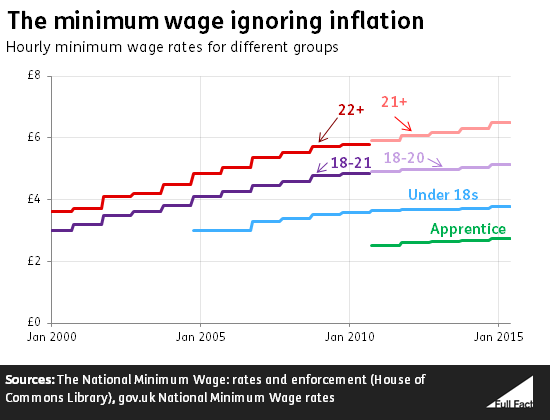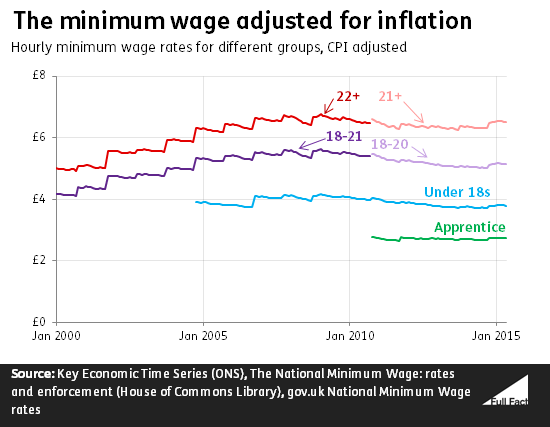Ask Full Fact: What's happened to the minimum wage?
Earlier this week we asked our Facebook followers for suggestions for a factcheck. Timothy Barson asked us "Has the real value of the minimum wage really dropped in past decades?". The minimum wage received quite a lot of attention during the election campaign (with a particular focus on what value it should take by 2020), so we thought it would be good to start with a classic.
If you want to suggest a factcheck, get in touch with us on Facebook or Twitter.
Doesn't the minimum wage rise every year?
In cash terms, the adult minimum wage has risen every year since its introduction.

Join 72,953 people who trust us to check the facts
Sign up to get weekly updates on politics, immigration, health and more.
Subscribe to weekly email newsletters from Full Fact for updates on politics, immigration, health and more. Our fact checks are free to read but not to produce, so you will also get occasional emails about fundraising and other ways you can help. You can unsubscribe at any time. For more information about how we use your data see our Privacy Policy.
The exact amount of any increase depends on a number of things. The Low Pay Commission, which advises the government on the minimum wage, will generally look at the state of the economy before deciding what recommendations to make. This would mean taking into account things like the effect a rise might have on employment.
But in real terms, it's a different story
While the adult minimum wage has risen every year, so have prices. If we adjust for inflation and look at how much the minimum wage buys, we can see that the answer to Tim's question is that the adult minimum wage is worth more than it was when introduced, but less than it was in 2007.
The minimum wage rates are usually updated in October, while prices change throughout the year. This is why the 'steps' in the real terms graph are sloped: the real value of the minimum wage jumps when it's updated, and is then usually eroded over the course of the year.
This also works the other way around: when inflation is negative and prices fall, the real value of the minimum wage rises.
Since 2008, there's been a bit of a change in the pattern. Before that point, the real value of the adult minimum wage trended broadly upwards. After the recession began, we saw a period where the real value of the minimum wage fell.
This makes sense; the Low Pay Commission take into account the state of the economy when they make their recommendations, and when unemployment is rising and wages are falling, increases in the minimum wage are likely to have unwanted effects on employment.
The last government changed the age bands
The Coalition made some changes to the minimum wage age groups. The rate for people aged 22 and over became the rate for people aged 21 and over, the 18-21 age group was changed to 18-20 and a new 'Apprentice' rate was introduced.
This rate (for apprentices aged 16-18, or apprentices over 19 in their first year) is set below the minimum wage for people under the age of 18. The general reasoning is that an apprentice is given training both on and off the job, and the employer is compensated for this additional cost through lower wages.
